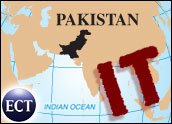
Service has been restored on a damaged telecommunications cable that links India and Pakistan to the West, but not before the international service outage caused widespread financial damage, most especially to the cell center industry.
Service on the cable was restored on Friday. The cable was damaged on June 27, largely cutting Pakistan’s telecommunications links with the outside world and disrupting India’s connections. The problem also caused disruption in the United Arab Emirates (UAE), Oman and Djibouti.
The five countries affected were linked to the undersea cable network called Southeast Asia, Middle East and Western Europe-3, also known as SEA-ME-WE3 or SMW3.
Some Call Centers Go Under
The cable damage was found nine miles (15 kilometers) southwest of Karachi, Pakistan’s main sea port. The cable was lifted up off the floor of the Arabian Sea to be repaired by a ship dispatched from the UAE. When the cable fault was initially reported, it was believed that the cable had been damaged 25 miles southwest of Karachi.
Service disruption in India was limited to telecommunication customers of the Reliance Group, which uses SMW3’s capacity in India. Call centers in India that operate solely with Reliance face financial losses, and some are expected to close as a result. Not only have these sole-supplier facilities lost operating revenues, some have lost clients as well.
The cable outage caused widespread economic damage and disruption in Pakistan, with 3,000 staffers reportedly laid off among the roughly 30 call centers that did not have backup capacity. Nine call centers in Pakistan reportedly had backup satellite connections provided at no cost by the government, although with latency rates at 450-550 milliseconds. The limit for commercial operations is 500 milliseconds for American clients.
Now that the cable has been repaired, latency rates to the U.S. from the NBA Computers call center in Karachi were less than 300 milliseconds in tests conducted with outsourcing project management firm InternationalStaff.net Friday.
However, widespread overloading of Internet connections was being observed as businesses came back online after 11 days of little or no service.
Bandwidth Losses, Latency Problems
Omar Khan, co-CEO of Netpace, said, “They were running the whole country on one line.” Netpace is a Silicon Valley firm that provides automated opt-in marketing and survey services in the U.S. via mobile phones. Netpace found itself largely cut off from its software development center in Pakistan after June 27 and had to adjust to slower Internet speeds over satellite backup systems hastily put in place.
Pakistan normally has 600 Mb (millions of bits) of external Internet connectivity available to it, according to local press reports attributed to V.A. Abdi, secretary of the Internet Service Provider Association of Pakistan (ISPAK). Abdi was also quoted as saying that during the cable outage, only 34 Mb of international Internet connectivity was available. ISPAK had earlier reported that Pakistan’s normal Internet consumption is 465 Mb, spread out among 10 million users and more than 50 ISPs.
The loss of Internet connectivity also hit the financial sector in Pakistan and forced some firms to revert to manually conducting some types of transactions. This caused backups that were particularly acute for international transactions.
The impact on the call center industry and IT services in Pakistan has led to widespread criticism of the country’s reliance on a single high speed cable, the paucity of satellite backup arrangements, and the prioritization of backup connections to support that country’s commercial call center industry at the expense of other businesssectors.
Previous Indian Fire
This stands in contrast to the reaction in India last September from the consequences of a fire at a telecommunications facility that provided last-mile services to most of the international call centers in that country.
The September fire in Chennai, India, got little notice in the Indian news media despite widespread service interruptions.
The fire was aggravated by poorly trained and poorly equipped emergency response personnel and by a lack of safeguards in a South Indian switching facility. The fire interrupted last mile connections for international voice lines at most international call centers throughout that country.
The immediate consequence for the call center industry in India from the fire was for most firms in the industry to arrange for backup connectivity, arrangements that limited the impact from the SMW3 failure that just ended.
Pakistan, which did not have Western-style press freedom prior to the current government, has featured SMW3 coverage on front pages of that country’s major newspapers every day since the outage began. There also has been daily reporting of the outage on every major television channel in Pakistan. Coverage has included substantial criticism of the government of Pakistan.
Criticism has included charges that the current government is focused on maintaining its political image rather than taking a serious look at the long term infrastructure needs of the call center and IT industry, which has been growing at the rate of 50 percent annually in Pakistan. There have also been calls to extend the 15-year tax holiday for call centers and software firms in Pakistan, rather than follow India’s path of accelerating new taxes for IT firms in that country.
Pakistan Government Attention
Babar Jhumra, who set up NBA Computers’ call center in Karachi and who has been a vocal government critic in the past, said that he was pleasantly surprised by Pakistan’s response to the SMW3 cable outage. The government had only agreed to provide backup capacity for 50 percent of NBA’s international voice line needs, but instead provided 100 percent backup capacity at no charge. The government also provided follow up calls three or four times every day to NBA to check to see if the backup links were performing properly.
Jhumra said that he was surprised at the level of customer service shown by the Pakistani government during the SMW3 outage. He only complained about latency issues with satellite connections. Latency problems occur because packets from satellites often do not arrive in the proper order and need to be reordered after they are received, which adds latency time.
The bottom line economic impact for NBA from the SMW3 outage was no loss at all, Jhumra said, because the company was considered an international call center and had worked with the government to set up backup connections before June 27. It was one of the nine firms that had reportedly made such arrangements.
Between 20 and 30 call centers in Pakistan were unable to continue in operation after June 27 as a result of the SMW3 outage because they had not made backup arrangements. IT firms that were not considered international call centers or business process outsourcing (BPO) firms were not provided with backup capacity and were impacted accordingly.
Industry Set to Expand
Losses to the IT and call center industry in Pakistan from the SMW3 disruption were estimated by Hayyan Faisal of the Pakistan Times at US$50 million. This is not an easy figure to verify because the size of the industry as a whole has not been accurately calculated.
Businesses are reluctant to report income levels in Pakistan, despite the 15 year tax holiday enjoyed by international call center firms and the export-oriented IT industry. The standard business tax rate in Pakistan is 5 percent (for non-exempt firms) and there is unrestricted foreign profit repatriation.
There are now about 40 international call centers in Pakistan, employing 3,000 people. Those figures are set to grow in response to new local investments and the arrival of U.S.-based Worldbridge Connect. Worldbridge was founded by Gurujot Singh Khalsa and his associates, who sold off their Indian call center assets and are shifting operations to Pakistan. Khalsa is an American.
Khalsa’s new call center in Lahore, Pakistan, has the potential to quickly scale up the industry in that country.
New International Connections
“This breakdown [in SMW3] was a reality check for the infant call center and BPO industry in Pakistan,” NBA Computers’ Jhumra said. A positive outcome was the realization of the importance of the two new international connections that are under construction now, he explained.
Jhumra said that the construction of a new high speed connection to India was started July 2. He said that project is being speeded up under pressure from Pakistan’s Information Technology Minister, Awais Leghari. Leghari is also working to accelerate the startup of another submarine cable for Pakistan, which will also serve India.
The new submarine cable, SEA-ME-WE 4 (SMW4) is now scheduled to go live in October. It will provide Bangladesh with high speed connectivity as well, ushering in competition for IT outsourcing services opportunities from an English-speaking country that to date has largely remained on the sidelines of the outsourcing boom.
Anthony Mitchell, an E-Commerce Times columnist, has beeninvolved with the Indian IT industry since 1987, specializing through InternationalStaff.net in offshore process migration, call center program management, turnkey software development and help desk management.
















































